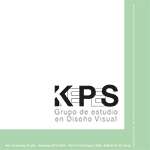Authors
Abstract
Contemporary society observes particular conditions of deterioration, distinguished in the pathological social behaviors generated by the mass media, previously by the televised radiated image and recently by the contents and digital platforms mediated by the Web. These social damages that originate in the image must not only be corrected to avoid increasing the obvious social pathologies generated, but also to make use of the media that form them to counteract them through design as a coadjutant of social well-being. “Social absurdity” defined by Foucault suggests a deep subjectivation of the postmodern subject diminished in his cognitive faculties by the formal hypermedia visual representations, whose consequences tend to be disastrous. It is necessary to emphasize that design covers an important part of the culture not only as material culture but also, and particularly, as symbolic culture. Therefore, it is essential that the areas of design boast axiological quality properties not only aesthetic, but mainly ethical. Thus, the aim of this work is to problematize this social absurdity, as well as the possibility of palliating it from the design in its visual symbolic manifestations. To this end, Michel Foucault's stance around the term “social absurdity” is characterized and the principles are extrapolated to today´s society characterized by the digital media of cyberspace, to later argue the role of design as visuality in these hyper-technified media. Finally, arguments are proposed about the possibility of returning to the ethics of social welfare to design. Methodologically, it is about the exploration of texts linked to the media problems of today’s society and the symbolic production from the image in the technological media, to propose ethical principles to improve the contents of visual design.
References
Baudrillard, J. (1978). Cultura y simulacro. Barcelona, España: Kairós.
Baudrillard, J. (2010). Crítica de la economía política del signo. Madrid, España: Siglo XXI Editores.
Cruz, B.A. (2014). Reconfiguraciones móviles. Los dispositivos virtuales como espacios de la visualidad (tesis posgrado). Maestría en Estudios Visuales, Universidad Autónoma del Estado de México, Toluca de Lerdo, México.
Eco, U. (2010). La estructura ausente. Madrid, España: Lumen.
Fromm, E. (1964). Psicología de la sociedad contemporánea. Ciudad de México, México: Fondo de Cultura Económica.
Foucault, M. (1987). Hermenéutica del sujeto. Madrid, España: La Piqueta.
Haug, W.F. (1980). Publicidad y consumo. Crítica de la estética de las mercancías. Ciudad de México, México: Fondo de Cultura Económica.
Jameson, F. (1996). Teoría de la postmodernidad. Madrid, España: Trotta.
Kiley, D. (1994). El síndrome de Peter pan: hombres que nunca crecieron. Barcelona, España: Vergara Bolsillo.
Kristeva, J. (2012). La productividad llamada texto. En R. Barthes, Lo verosímil. Buenos Aires, Argentina: Tiempo Contemporáneo.
Lipovetsky, G. (2000). La era del vacío. Ensayos sobre el individualismo contemporáneo. Barcelona, España: Anagrama.
Lyotard, J.-F. (2006). La condición postmoderna. Madrid, España: Cátedra.
Margolin, V. (2015). Design for the good society. Rotterdam, Netherlands: NAi Publishers.
Papanek, V. (1977). Diseñar para el mundo real. Ecología humana y cambio social. Madrid, España: H. Blume.
Pressman, R.S. (2006). Ingeniería del software: un enfoque aplicado. Ciudad de México, México: McGraw-Hill.
Sennett, R. (2000). La corrosión del carácter. Las consecuencias personales del trabajo en el nuevo capitalismo. Barcelona, España: Anagrama.

 pdf (Español (España))
pdf (Español (España))
 FLIP
FLIP






















